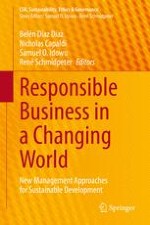2020 | OriginalPaper | Buchkapitel
The Impact of Environmental Management Accounting Practices on Organizational Sustainability of the ISO 14001 Companies in Thailand
verfasst von : Kwannaree Klaprabchone, Montree Chuaychoo, Worakorn Chaemmuangpak
Erschienen in: Responsible Business in a Changing World
Verlag: Springer International Publishing
Aktivieren Sie unsere intelligente Suche, um passende Fachinhalte oder Patente zu finden.
Wählen Sie Textabschnitte aus um mit Künstlicher Intelligenz passenden Patente zu finden. powered by
Markieren Sie Textabschnitte, um KI-gestützt weitere passende Inhalte zu finden. powered by
